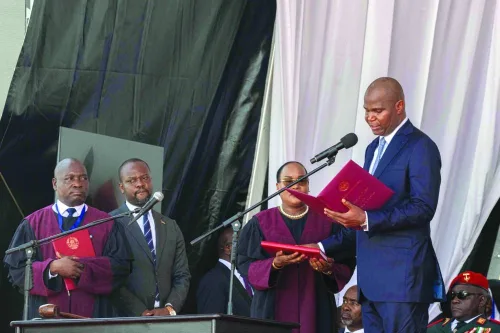
Mozambique’s new president, Daniel Chapo, was inaugurated on Wednesday in the capital city of Maputo, surrounded by both celebration and discontent. Hundreds of opposition supporters gathered only meters away from the swearing-in venue to voice their frustrations, though security forces armed with guns and batons prevented them from reaching the ceremony’s front lines. Chapo, a 48-year-old law graduate, becomes Mozambique’s fifth president and the first born after the country’s independence from Portugal in 1975.
During his inauguration speech, Chapo pledged to pursue national unity and social harmony, describing stability as the “priority of priorities.” He acknowledged public outrage, referencing the mass demonstrations that erupted following disputed elections in which he secured 65.17% of the vote. International and local human rights groups say the post-election crackdown has claimed at least 300 lives, including dozens of children.
Opposition leader Venâncio Mondlane, who garnered 24% of the vote according to official counts, returned from self-imposed exile earlier in January to lead renewed calls for “restoration of the electoral truth.” He maintains that the election results were fraudulent and claims his life was threatened after two senior party members were assassinated.
The challenges facing Chapo extend beyond post-election tensions. Mozambique is grappling with a seven-year jihadist insurgency in the resource-rich province of Cabo Delgado, as well as a persistent unemployment crisis, rampant corruption, and frequent strikes by civil servants. In his inaugural address, Chapo vowed to streamline government by cutting ministries and top positions, potentially saving $260 million, which he pledged to channel toward improving citizens’ welfare. Observers remain cautiously hopeful yet skeptical, noting that past reform promises have yielded limited progress.
